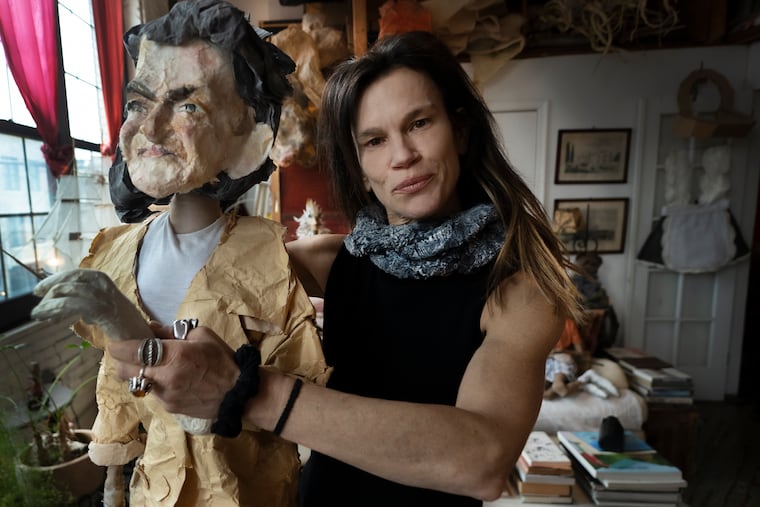A band of magical puppets are moving out of its South Philly home
Sebastienne Mundheim's handcrafted creations are making their way over to the Arden Theatre, Penn Live Arts, and the Delaware Contemporary, this season.

Sebastienne Mundheim is alone when I arrive at her South Philly loft two days after Christmas, but the space is far from empty. Wherever you turn, other faces look back — most of them papier mâché, with fabric or cardboard for hair. The life-size figure of a man slumps in a chair near the kitchen; puppets the size of small children perch on the whimsically mismatched furniture; an enormous pink head glares from its perch across from a lanky youth dangling above a crowded workbench.
This congregation has gathered over several decades as Mundheim has crafted puppets, props, and scenery for theater and installation pieces, often in collaboration with theaters, museums, and arts organizations throughout the Philadelphia region. In just the past year, that has included work with the Arden Theatre Co.’s Ballet X, Theatre Exile, and New Jersey’s ArtYard.
Within a few days of my visit, most of these lovingly crafted objects would leave Mundheim’s apartment for the first time since they last moved on stage, destined for “Recraft,” a new exhibit at the Delaware Contemporary examining the interplay of art and craft. Though she expressed trepidation in the lead-up to the move, a few days into the new year Mundheim described the in-progress installation as “magical” — a word that she employs often.
“It was still dark out when we started to load the truck, so the streetlights cast shadows as these characters were moving down the sidewalk,” Mundheim described. “It was kind of exciting, like everybody coming back to life in the middle of the night in The Nutcracker.”
Handmade is another word that crops up regularly when discussing Mundheim’s work. Her puppets have a charmingly rough-hewn look as if cobbled together from whatever materials happened to be close by and salvageable. She never strives for the illusion of reality in her work, nor does she hide the puppeteers or mechanisms that manipulate them.
“I really appreciate actors’ ability to embody a character, but that’s not what I do,” she said. “I don’t pretend to be somebody else. I’m very much myself, and the materials are themselves.”
Her approach hearkens back to her childhood love of making things, which included dozens of “monsters” cobbled together from found objects that took up residence under her bed. She credits her grandmother, who brought a spirit of self-sufficiency from her native Latvia and taught her to sew.
Mundheim only started animating her creations later in life, inspired by her longtime practice of Shotokan karate. At that time, she was involved in museum education and began incorporating her crafts into the storytelling. She found that the deep understanding of the body and its movements gained through martial arts could give breath to the inanimate objects she used to interpret exhibitions for her students. She typically allows other performers to work her puppets while she narrates — her calm, measured tones setting a dreamlike pace for her shows.
Philly audiences currently have a few options for seeing Mundheim’s creations come to life. She crafted the fantastical giant heads and the puppet incarnation of lead character Sophie for the Arden’s adaptation of Roald Dahl’s The BFG (Big Friendly Giant), which runs through Sunday. That same day, Penn Live Arts will present two performances of Bartok’s Monster, an exploration of journalist and UPenn lecturer Jay Kirk’s book Avoid the Day: A New Nonfiction in 2 Movements for which Mundheim collaborated with the Daedalus Quartet and Pig Iron Theatre Co.
“Sebastienne is wonderfully old school and analog,” described director and Pig Iron cofounder Dan Rothenberg. “Jay’s book is very difficult, intricate, and purposefully confounding. Sebastienne put together a spine of images that spoke to her as a sculptor and theater maker, and that became the script that we’re working from.”
Mundheim found her way into Kirk’s thorny text through Bartók’s Cantata Profana, for which the Hungarian composer adapted a pair of Romanian ballads. The story involves a hunter with nine sons, who are magically transformed into stags. In their new form, they find themselves unable to return home, but their father refrains from shooting them, recognizing some glimmer of their former selves in their eyes.
“I liked that because inside of a very simple story, there’s so much room to think about things,” Mundheim explained. “In my own work I try to keep the stories deceptively simple, but the work is really about the pauses between sentences or the empty space between the figures. Those are the places where the audience is invited in to engage.”
Looking around at her body of work transposed to a museum setting, Mundheim allowed a bit of wonder to coexist with the typical artist’s self-criticism. Viewed in terms of craft, suddenly, every stitch, every bit of paper glued to a frame, every carefully placed eyelash represented hours of old-fashioned work.
“I suppose I could do things according to modern times, but so far I just keep doing stuff the same way,” she shrugged. “I guess when you do things the same way for a long time, even if it’s not the best way, you get kind of good at it.”
“The BFG” runs through Jan. 21 at Arden Theatre Co., 40 N. 2nd St., 215-922-1122 or ardentheatre.org
“Bartok’s Monster” takes place at 2 p.m. and 7 p.m. Jan. 21 at the Annenberg Center, 3680 Walnut St., 215-898-3900 or pennlivearts.org
“Recraft” runs through May 26 at the Delaware Contemporary, 200 S. Madison St., Wilmington, 302-656-6466 or decontemporary.org